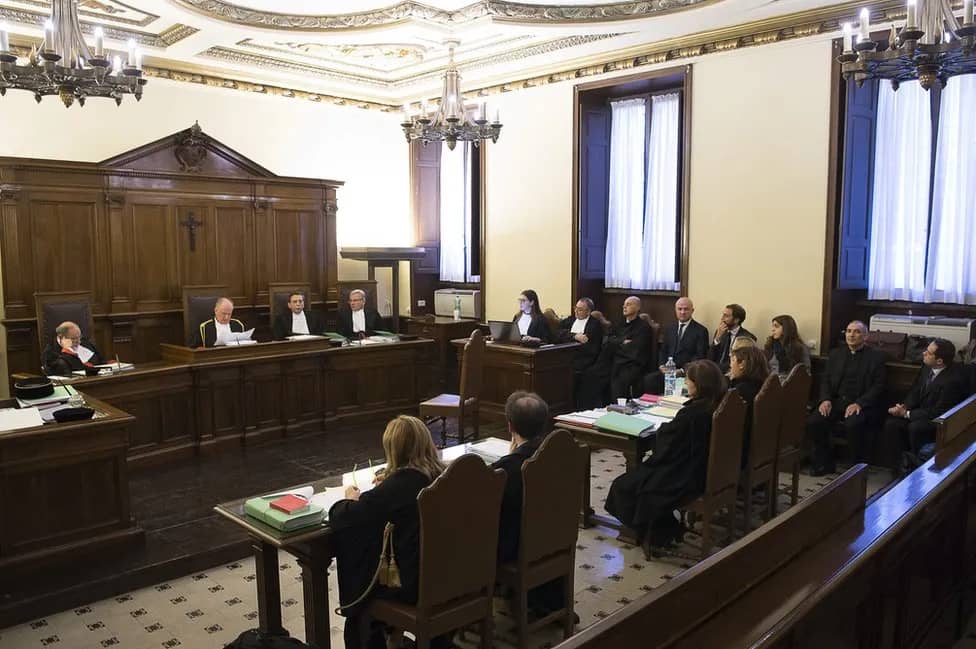It’s not often that a pope publicly takes his own bishops to the woodshed, accusing them of dropping the ball on something the pope himself put in their job description, but that’s in effect what happened on Saturday when Francis addressed implementation of his revisions to the annulment process at the two-year mark.
As part of a broader reform of the Church’s pastoral approach to marriage and the family, Pope Francis in 2015 overhauled the rules for what are popularly known as “annulments,” meaning a declaration from a Church tribunal that a sacramental marriage never existed because one or more of the conditions for validity were not met.
The pontiff’s changes were intended to make the process more user-friendly, thereby encouraging more couples whose relationships had broken down to explore whether a declaration of nullity is possible. A core element of those reforms was a new “expedited process” for cases in which neither spouse contests the request for a declaration of nullity, and the evidence is clear.
At the heart of that option, as the pope envisioned it, was that the diocesan bishop himself would personally judge the case.
Those revisions to the nullity process came in two motu proprio, meaning documents on the pope’s personal initiative, titled Mitis Iudex Dominus Iesus for the Latin church and Mitis et misericors Iesus for the Eastern churches.
On Saturday, Francis said that two years after his reforms, it doesn’t look like the bishops are actually taking on the personal role laid out for them, instead delegating practically everything to church tribunals. As a result, Francis issued a fairly blunt warning: Getting personally involved, the pontiff told the bishops, “isn’t a choice, but a duty.”
Lest anyone miss how strongly he feels about it, Francis specified that he was issuing these marching orders to the world’s bishops “on the basis of the office of Bishop of Rome and Successor of Peter.”
The setting for the pope’s remarks on Saturday was an audience with participants in a course on procedures for a declaration of nullity organized by the Roman Rota, the Vatican’s main court handling marriage cases.
Always, Francis said, the diocesan bishop is the Iudex unum et idem cum Vicario iudiciali, a Latin phrase from canon law that means the “one and the same judge, with the judicial vicar.”
“But since that principle is being interpreted in a manner which, de facto, excludes the personal exercise [of that responsibility] by the diocesan bishop, delegating almost everything to the tribunals,” Francis said he was establishing certain rules he sees as “determining and exclusive”:
- “The diocesan bishop, in force of his pastoral office, is the lone and personal judge for the expedited process.”
- “Thus, the figure of the diocesan bishop-judge is the architrave, the constitutive principle and the discriminating element, of the entire expedited process instituted by the two motu proprio.” (In classical architecture, an “architrave” is the main beam resting atop a series of columns, which often supports the weight of the entire structure.)
- “For the expedited process to be valid, two essential conditions are required: The episcopate, and being the head of a diocesan community of faithful. If one of those two conditions is missing, the expedited process can’t happen and the case must be judged with the ordinary process.”
- “The exclusive and personal competence of the diocesan bishop, placed among the fundamental criteria for the expedited process, makes direct reference to the ecclesiology of Vatican II, which recalled that only the bishop, in his consecration, already has the fullness of all power that’s ad actum expedita (ready to be put into action), through the missio canonica (canonical mission).”
- “The expedited process is not an option that the diocesan bishop may choose, but a duty that belongs to him through his consecration and from the missio he received.”
If a bishop doesn’t have any clergy or laity with the necessary legal expertise to provide the guidance he needs, Francis said, then a neighboring bishop should step in to help “for as long as necessary.”
The pontiff wasn’t backing off his core message: “The decision to pronounce [a ruling] coram Domino (in the presence of the Lord) is always, and only, one of the diocesan bishop,” he said.
That’s a responsibility, Francis said, a bishop simply can’t shirk.
“To entrust the entire expedited process to an inter-diocesan tribunal (either in a neighboring diocese, or one operated by several dioceses) could distort the figure of the bishop as father, head and judge of his faithful, reducing it to a mere signing of a sentence,” he said.
On other points, Francis reaffirmed the importance of bringing the nullity process closer to the people who need it and ensuring that it’s free of charge, calling those “two pearls that the poor need, and that the Church should love above anything else.”
The pontiff also specified that if there’s any question about jurisdiction over an appeal from the expedited process, the Dean of the Roman Rota has the exclusive power to decide without needing confirmation from anyone else.
Francis presented the two motu proprio with his reforms for nullity procedures as a fruit of his two Synods of Bishops for the family, held in October 2014 and 2015.
“These two proceedings came out of a synodal context, and are expressions of a synodal method,” the pope said. “They’re the result of a serious synodal path.
“Facing the most painful questions regarding our evangelizing mission and the salvation of souls, it’s important that the Church more and more recover the synodal practice of the first community in Jerusalem, where Peter together with the other apostles and the entire community, under the action of the Holy Spirit, sought to act according to the commandment of the Lord Jesus,” Francis said.
















